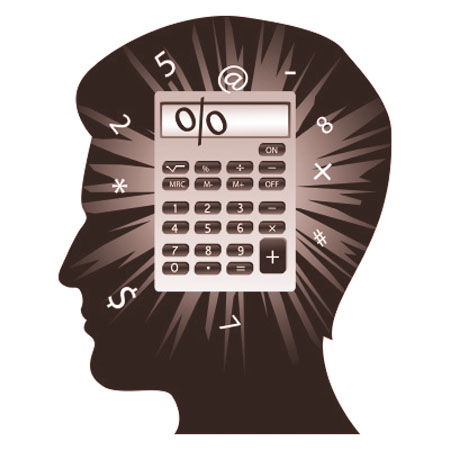What Is Mental Accounting?
What Falling Down the Stairs Can Teach You About Money
A client, Jay, came in today confused. He’d gotten angry that he had to pay $50 to stay at a local motel next to his work instead of driving an hour at midnight to get home. When on his lunch break he heard the nurses talking about how hungry they were, he whipped out his credit card and offered to pay for Chinese takeout for 7 people for a total of over $60. When he visited his 2 nieces he spent over $100 taking them out to lunch and to an amusement park.
Why did he react in anger to paying for the motel and with joy when he spent more than 3 times that amount on the nurses and his nieces?
A dollar is worth a dollar no matter where it comes from or how it is spent. Dr. Richard Thaler of the University of Chicago, the father of the behavioral economic’s term “mental accounting,” would say that Jay is doing what most of us do.
We have a rough idea in our heads how much we believe it is good to spend in a particular category. Some of us go further and define on paper what is good to spend on food, entertainment, travel and other discretionary categories. When the amount we imagine to be is within the limits of what we have roughly defined we are fine, but when it is above that limit it is not so fine. In Jay’s case, the $50 motel expense exceeded his rent category limit so he was consequently angry.
A Recent Fall Reminds Me of Mental Accounting
It was dusk… blood stained the stairs… glasses broken. I’d tripped and fallen head first down the church’s granite stairs. Dazed, I managed to get up and get help in the nearby parish house. Fortunately, no permanent damage was done-only a black eye, several bumps on the head, a sprained ankle and an anxious feeling that it could so easily happen again.
To put the accident behind me I decided to put myself on the healing fast track. First, get ace bandages, Advil, arnica gel, ice bags, heat pads and other “miscellaneous healing equipment.” Before I knew it, I’d spent over $150 on these supplies. That was just the beginning. A visit to my primary doc to make sure I didn’t have a break or a concussion and then on to the physical therapist who had her list of healing recommendations.
I’m usually careful about spending money, but this accident had thrown my caution to the wind. My healing spending is what behavioral economists call “mental accounting.” What exactly does that mean?
When you spend money no matter what you spend it on or where it comes from or how you think about it, it doesn’t change the worth of the dollar. If you are careful about spending in general, then by logic you should be careful spending money on utilities, food, birthday gifts or vacations. But that is not typically how people behave, not because they are ridiculous but because people have feelings that sometimes dictate what they do.
Back to “mental accounting.” Because good health is essential to my well being I (in the moment) didn’t care how much I spent on healing goods – I didn’t bother to comparison shop or think through what I already had at home. I was focused on healing and that’s what counted.
Now that I am healing and know I’ll be walking normally soon, I look at all the unnecessary things I bought and wonder, “What was I thinking?”
Mental Accounting Case Study
A classic research study of mental accounting posed the following 2 scenarios to the study participants:
- You go to the movies with the ticket you bought earlier but realize in line that you have lost the ticket. What would you do?
- You go to the movies with the intention to buy your ticket but realize in line that the $20 you had in your pocket fell out. What would you do?
A significant majority of the participants said that if they’d lost the $20 they would buy another ticket. BUT if they lost the TICKET they’d forgo seeing the movie rather than spending the money on another ticket. Losing the ticket and paying for another was exceeding the limit of their entertainment category, but losing the $20 is MONEY lost, not from the entertainment category, but from the category of “sometimes it happens that you lose money.”
The point is that we all treat money differently according to how we categorize it. Otherwise, why would Jay get so mad about paying $50 for a motel room but not even think about spending over 3 times that amount for Chinese food and entertainment?
There is nothing pathological about mental accounting. We want stay within our spending values and limits. Mental accounting may, however, highlight blind spots about spending that we may be unaware of. When Jay realized that his category of “spending money on other people” was limitless and that his “spending money on himself “ was too restrictive, it enabled him to think through what he was doing and make changes. Talking with me made him aware it was not the rent or food category that was at play here, but it was what he allowed himself to spend on himself vs. what he was willing to spend on others.
More Examples of Mental Accounting
Here is another example in which where the money comes from is the mental accounting issue. You inherit $10,000 from your Great Aunt Nellie. Suddenly you are on the phone to 6 friends inviting them out for a celebratory dinner on such good news (and you tell them you’ll be picking up the tab). The money came from an unexpected windfall. Would you do the same thing if the money had come from your hard earned salary?
The category of “windfall” makes the experience of having the money feel very different from what it feels like to splurge on 6 friends with salary money. In fact, the worth of the money is the same no matter where it comes from!
A final example: A neighbor put $300 worth of charges on 3 credit cards ($100 on each credit card) when she bought some clothes. When her husband asked her how much the clothes cost, she said $100. When he saw the credit card statements at the end of the month and saw $100 x 3 he confronted his wife who said it was really just $100 3 times so it was $100.
The issue here is that her (and particularly her husband’s) mental account of how much she should spend on her shopping outing was $100. When she got to the store she couldn’t resist a few more items that brought the total to just about $300. She couldn’t face the shame of going over her limit so she fooled herself into believing that she only spent $100 by putting that amount on each of 3 credit cards.
Understanding how mental accounting works can help you think through how you spend money more clearly and help you stay in charge of the money choices you make.
Do you have a mental accounting story you would like to share? I’d love to hear about your experiences in the comments below.
Maggie Baker, Ph. D.
Psychologist – Financial Therapist
Author of Crazy About Money: “How Emotions Confuse Our Money Choices And What To Do About It”.

